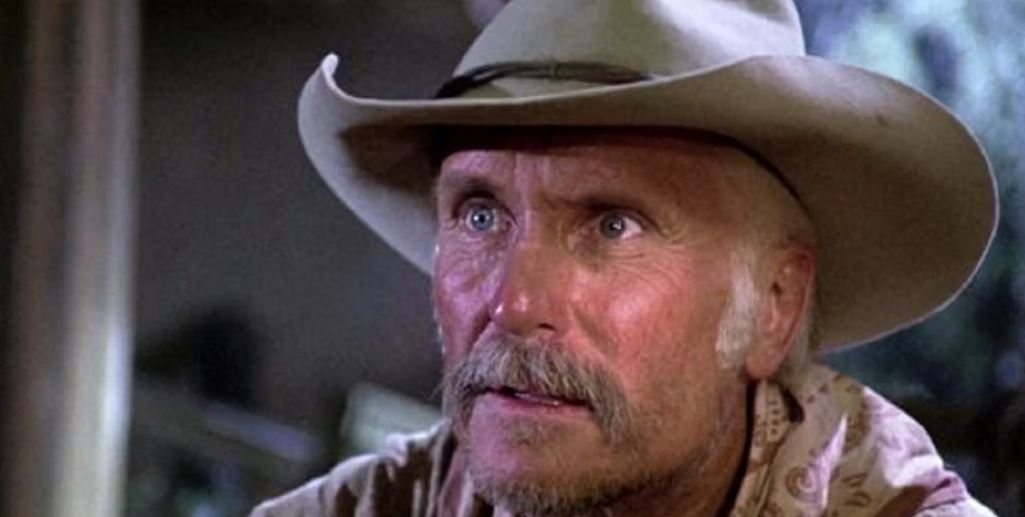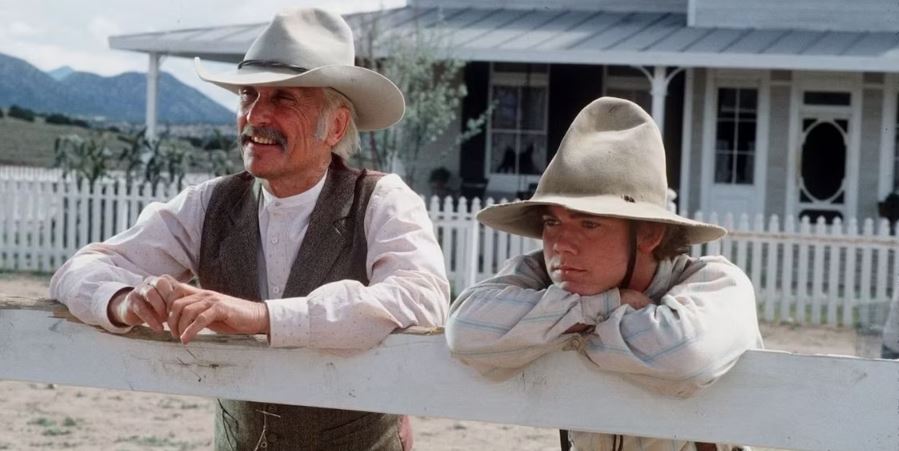Based on the novel by Larry McMurtry, the 1989 Western miniseries Lonesome Dove entered an entertainment landscape that had largely given up on both miniseries and Westerns in general. By the time the story wrapped up, a story that was split into four parts at a whopping 384 minutes combined, Lonesome Dove had revitalized both. The miniseries was popular, averaging nearly 40 million viewers, and it was good, having been nominated for 18 Emmy Awards and winning seven. Critics lauded everything from the cast, the scenery, up to the sheer majesty of the production itself. It was hailed then as one of the best Westerns of its time, even of all time. Looking back at it post-Unforgiven, another touchstone moment in the history of the Western genre, one may question if Lonesome Dove is still worthy of its accolades. It is.
Lonesome Dove takes place in the late 1870s, and the story begins in the Texas border town of Lonesome Dove. Two famed former Texas Rangers, Captain Augustus “Gus” McCrae (Robert Duvall) and Captain Woodrow F. Call (Tommy Lee Jones), run a horse stable on the edge of the small town. The pair complement each other well, with Gus a twice-widowed, affable soul who doesn’t work too hard, while Call is a strict workaholic who keeps his emotions hidden beneath his gruff exterior. One day, a long-lost former Texas Ranger and friend, Jake Spoon (Robert Urich), shows up on the doorstep, a wanted man after inadvertently shooting the mayor of Fort Smith, Arkansas. His tales of the wonders of Montana move Call, who proposes gathering a herd of cattle to drive them there and settle in the pristine north.
‘Lonesome Dove’ Is an Unflinching Look at the Real West

From there, Lonesome Dove follows the journey of Gus, Call, and their companions: Joshua Deets (Danny Glover), a tracker and scout from their Ranger days; hard-working but thick-headed former Ranger “Pea Eye” Parker (Tim Scott); Bolivar, (León Singer), cook and former Mexican bandit; and 17-year-old Newt Dobbs (Ricky Schroder), who doesn’t know that Call is his father. It’s a journey that is filled with inclement weather, cattle rustling, gunfights, a good-hearted prostitute, and death, hitting all the tropes of the Western and more.
What sets Lonesome Dove apart from other Westerns is in how it doesn’t glamorize the West. There is no white-hatted hero, just a group of imperfect, haggard, unkempt men simply trying to survive. Their surroundings are not pristine, but rather a collection of well-worn locales that speak to the harshness of their world. The women are whores, or at the very least treated as such. Death comes from anywhere, at any time, and not just at the hands of a gunslinger. And it is cruel.
At the same time, Lonesome Dove subverts the Western genre throughout. Frederic Forrest’s Blue Duck, a half Native-American, half Mexican bandit, is a true, murderous villain, but he exists in a gray world. The cattle and horses needed for the drive were stolen. U.S. cavalry soldiers exert their authority violently, whipping Newt as punishment for not freely surrendering their horses to the soldiers, prompting Call to beat one of them nearly to death, only stopped by Gus before doing so. The bad people do bad things, and so do the good.
When they enter Montana territory, Native Americans steal a dozen of the group’s horses, but not for nefarious reasons, which so often happens in Westerns in need of faceless villains. They are starving, and only did so in order to eat. More importantly, this fact is recognized by Deets, who prevents Gus and Call from storming the area and killing the innocent Natives to reclaim their horses. It’s also a scene that, more than any other in Lonesome Dove, speaks to the theme of death’s cruelty. After the Natives are scared off, Deets comes to the rescue of a blind Native child left behind, but his benevolent action is misunderstood by a nearby Native, who impales Deets with a spear. It’s a good man, doing a good deed, and yet he still pays a price for it.
‘Lonesome Dove’ Goes Deep

The miniseries format of Lonesome Dove is another asset, allowing the viewer the time to develop a far deeper connection to the characters than what is normally afforded in a “typical” Western. Over the course of six hours, we get to know the characters intimately. The regret of Gus’ former love Clara (Anjelica Huston) for not saying “yes” to Gus’ proposal years before stings that much more.
The anger she feels towards Call for keeping him from her. Denying them happiness may be unfair, but it is relatable and understandable, because we get the time to know them. When Gus would rather face death than have his other leg amputated, we know his pride, his need to do things on his own terms, won’t allow him to do it. We mourn his decision, but, again, we understand it.
Of course, none of this matters without having actors that can pull it off, and Lonesome Dove has that in spades. The casting is spot on, and some of the “lesser lights” — Urich, Diane Lane, Glover — deliver characters that feel real, not just stereotypes or caricatures. Three performances specifically, though, deserve recognition. Robert Duvall, already an acclaimed actor since his start as Boo Radley in 1962’s To Kill A Mockingbird, is perfect as Gus. His eyes speak to the wisdom of the character, his face betraying one that has seen many things yet still seeks to find the humor in it all. Duvall nails the grace of Gus, and his personality that sees Gus as a father figure and stern protector.
Ricky Schroder gets to show off his talents, shaking off the image of his Ricky Stratton role in the 1980s sitcom Silver Spoons by deftly taking his character from teen to man, gradually building his maturity through the events he experiences on the drive. The real surprise in Lonesome Dove is Tommy Lee Jones. For anyone who relates the actor to his one-note Agent K role in the Men In Black films, the way Jones slowly breaks down the walls of Call is nothing short of amazing.
His introduction in the series promises that same note, but by the end, when we see Call weeping openly over the grave of Gus after having brought his body back to Texas, one would have to have a heart of stone to feel nothing. It’s a depth that we don’t see often enough from Jones over the course of his career. Lonesome Dove succeeds as a Western by both adhering to its rules and disobeying them outright in equal measure. It succeeds by imbuing an emotional depth unlike its kin. It succeeds in grand cinematography and realism. Lonesome Dove, simply, succeeds.
